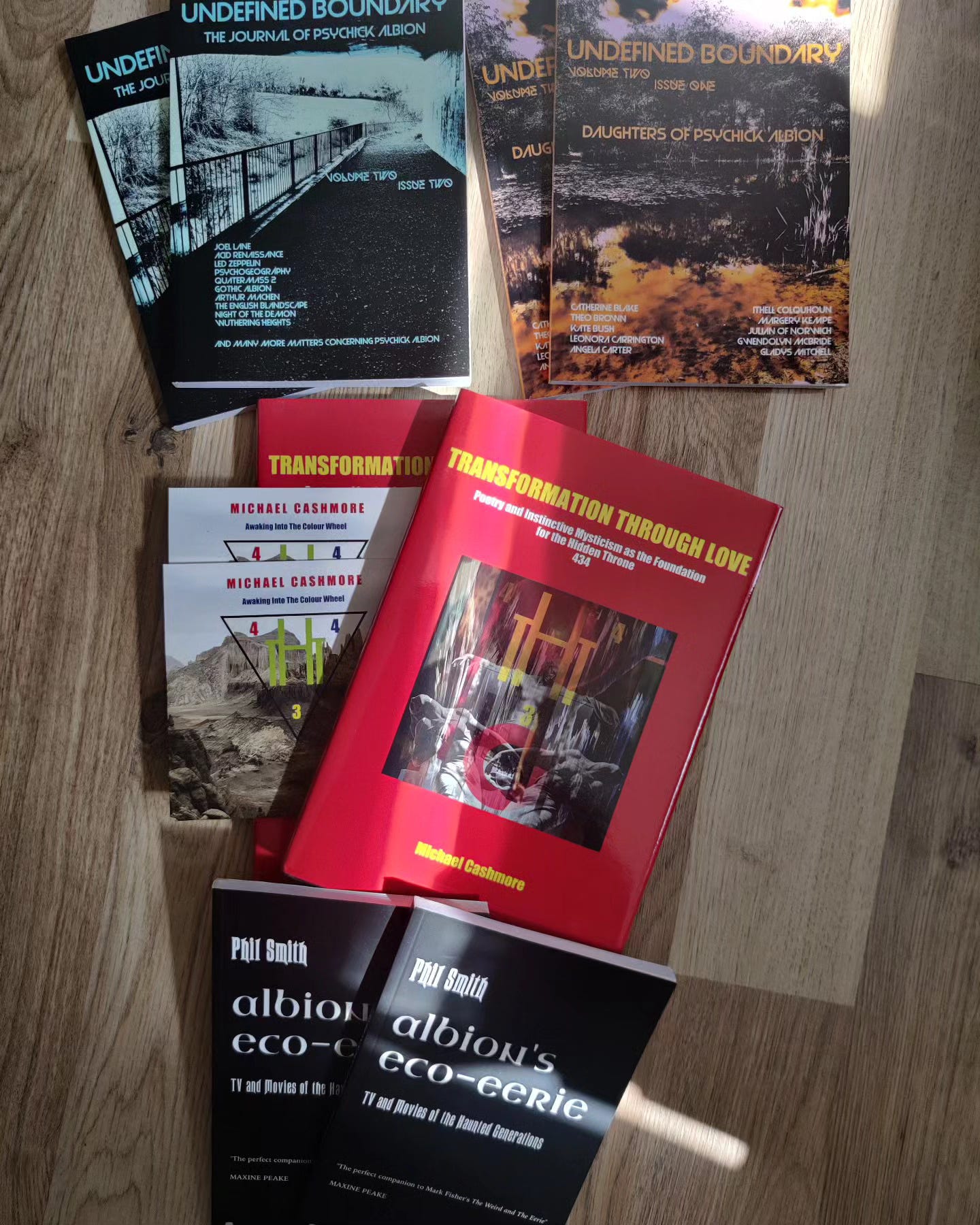Hello and welcome to this week’s newsletter.
Reflections on Psychick Albion
Recently I’ve been through a period of sober reflection; I guess it’s something that happens at my age. In the four years since I started Temporal Boundary Press we have published four issues of the Detectorists zine, four issues of the Coil zine, six issues of Undefined Boundary, a hardback book and CD by Michael Cashmore, and a paperback book by Phil Smith. My default personality is melancholic, pessimistic and depressive but when it comes to TBP I consciously make an effort to be as positive as possible and, in that spirit, I think I can say that I am very proud of what we have achieved so far. I’ve given some thought as to why it is that I seem able to prevent my terrible personality from leaking through and infecting my publishing work and I think it’s to do with the fact that my work with TBP leads me into somewhere that goes way beyond the individual.
This happens at a number of levels. Working and networking with the people who contribute to TBP is of course a joy, but in addition to this, the content of what we publish often gestures towards something beyond individualism, whether it be the potential of non-human agency (angels, demons, etc.) or the potential of human communalism. The moment that set me on this path was my discovery of the phrase ‘Psychick Albion’. That term captured everything that I had been intuitively working towards previously, and set a template for how to explore it further. Psychick Albion refers to a state of mind and a specific location but it is important to emphasise that the conjunction of those two words allows the possibility of something much more expansive. The ‘psychick’ element is evocative of psychedelic, magickal possibilities but with an awareness that solipsism and hubris must be avoided. Aleister Crowley declared that “there is no God but man”. I completely reject that. Not because I think that God is higher than man but because I reject the notion of a hierarchy of being.
In order to avoid the hubris of religion or of humanism it is necessary to ground one’s subjective imaginings in a particular place: Albion. To be explicitly clear, this is not to imply that there is any sort of special significance to this place above all others, except in the sense that (for me) it is here and now and as such it gives a material texture to my experience of being. There is a special significance to Albion but this special significance could be discovered anywhere. So, there is a subjective experience that takes place in a particular setting. In this interaction between mind and place, magick occurs. As TS Eliot put it (meaning something quite different): “Between the idea and the reality…Falls the shadow”.
To me, the idea of Psychick Albion is a continuation of Mark Fisher’s stillborn project of Acid Communism. Fisher died before completing his essay on Acid Communism but it is still well worth reading. Fisher had realised that one of capitalism’s greatest cons was in persuading us that it leads to much greater innovation, excitement and satisfaction than other economic systems. Much of his writing was dedicated to showing how, on the contrary, capitalism leads to a narrowing of possibilities, a dearth of experimentation and to cultural stasis. Fisher wanted to alert us to the fact that the techno-capitalist world presents us with the immediate satisfaction of appetite but that more comunitarian societies, such as Britain during the post-war consensus, achieve much more revolutionary and enduring legacies of cultural progression. The left is usually seen as being austere and worthy but Fisher wanted to show us that it had been (and could again be) psychedelic and sensual.
The project of Psychick Albion seeks to extend this insight into areas of magick, folklore, folk horror, pop culture, as well as hauntology. For us, the community of other beings (Gods, demons, animals, microbes, ghosts) is an important inclusion in the body politic. Our sense of engagement with place is guided by an awareness of the spirits of place. And these spirits of place need not be ethereal higher beings. As Phil Smith has shown in Albion’s Eco-eerie, they might just as plausibly be aspects of (or emanations from) the ecological substrate. However psychedelic the experience might be it is not about withdrawing within the self but about finding kinship with the other.
I would love to see the project of Psychick Albion exported to other places so that there might be a flourishing of similar ideas: a Wyrd Americana; a Gallic Grotesquerie; an Eerie Afrofuturism. The spirit of place is a universal phenomenon but its encounter is always unique, always born anew.
That’s all for this week!



Thanks so much Paul.
I just published a blog post about “Psychick Albion” at https://www.lazaruscorporation.co.uk/blogs/artists-notebook/posts/on-the-journal-of-psychick-albion